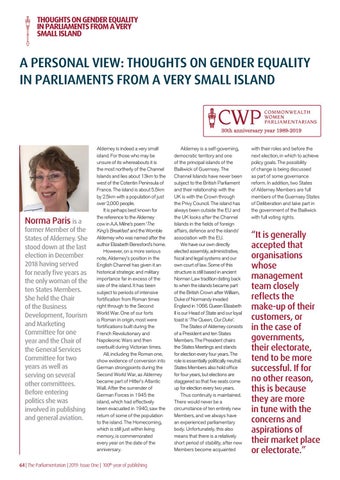THOUGHTS ON GENDER EQUALITY IN PARLIAMENTS FROM A VERY SMALL ISLAND
A PERSONAL VIEW: THOUGHTS ON GENDER EQUALITY IN PARLIAMENTS FROM A VERY SMALL ISLAND
Norma Paris is a
former Member of the States of Alderney. She stood down at the last election in December 2018 having served for nearly five years as the only woman of the ten States Members. She held the Chair of the Business Development, Tourism and Marketing Committee for one year and the Chair of the General Services Committee for two years as well as serving on several other committees. Before entering politics she was involved in publishing and general aviation.
Alderney is indeed a very small island. For those who may be unsure of its whereabouts it is the most northerly of the Channel Islands and lies about 13km to the west of the Cotentin Peninsula of France. The island is about 5.5km by 2.5km with a population of just over 2,000 people. It is perhaps best known for the reference to the Alderney cow in A.A. Milne’s poem ‘The King’s Breakfast’ and the Womble Alderney who was named after the author Elizabeth Beresford’s home. However, on a more serious note, Alderney’s position in the English Channel has given it an historical strategic and military importance far in excess of the size of the island. It has been subject to periods of intensive fortification from Roman times right through to the Second World War. One of our forts is Roman in origin, most were fortifications built during the French Revolutionary and Napoleonic Wars and then overbuilt during Victorian times. All, including the Roman one, show evidence of conversion into German strongpoints during the Second World War, as Alderney became part of Hitler’s Atlantic Wall. After the surrender of German Forces in 1945 the island, which had effectively been evacuated in 1940, saw the return of some of the population to the island. The Homecoming, which is still just within living memory, is commemorated every year on the date of the anniversary.
64 | The Parliamentarian | 2019: Issue One | 100th year of publishing
Alderney is a self-governing, democratic territory and one of the principal islands of the Bailiwick of Guernsey. The Channel Islands have never been subject to the British Parliament and their relationship with the UK is with the Crown through the Privy Council. The island has always been outside the EU and the UK looks after the Channel Islands in the fields of foreign affairs, defence and the islands’ association with the EU. We have our own directly elected assembly, administrative, fiscal and legal systems and our own court of law. Some of this structure is still based in ancient Norman Law tradition dating back to when the islands became part of the British Crown after William, Duke of Normandy invaded England in 1066. Queen Elizabeth II is our Head of State and our loyal toast is ‘The Queen, Our Duke’. The States of Alderney consists of a President and ten States Members. The President chairs the States Meetings and stands for election every four years. The role is essentially politically neutral. States Members also hold office for four years, but elections are staggered so that five seats come up for election every two years. Thus continuity is maintained. There would never be a circumstance of ten entirely new Members, and we always have an experienced parliamentary body. Unfortunately, this also means that there is a relatively short period of stability, after new Members become acquainted
with their roles and before the next election, in which to achieve policy goals. The possibility of change is being discussed as part of some governance reform. In addition, two States of Alderney Members are full members of the Guernsey States of Deliberation and take part in the government of the Bailiwick with full voting rights.
“It is generally accepted that organisations whose management team closely reflects the make-up of their customers, or in the case of governments, their electorate, tend to be more successful. If for no other reason, this is because they are more in tune with the concerns and aspirations of their market place or electorate.”
